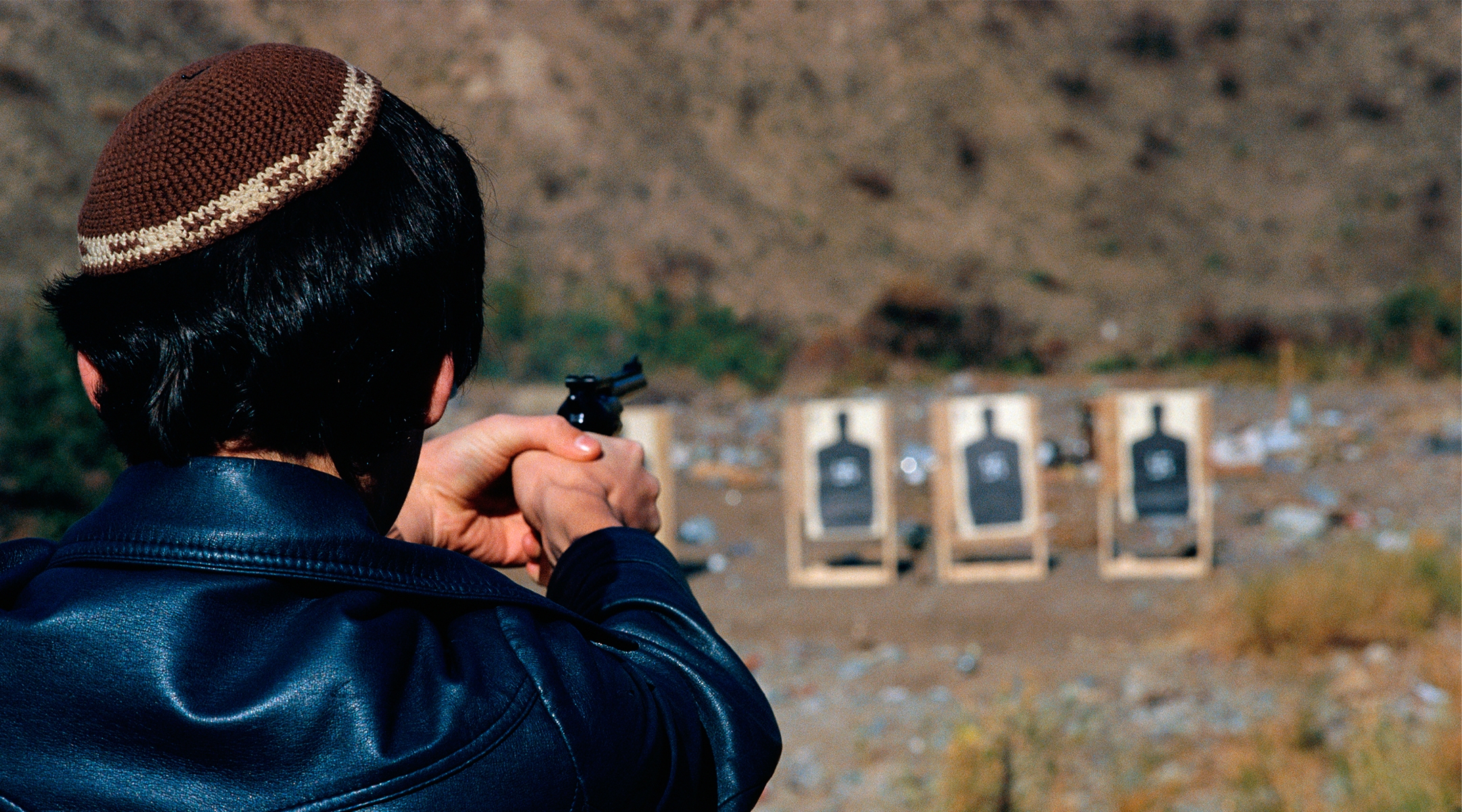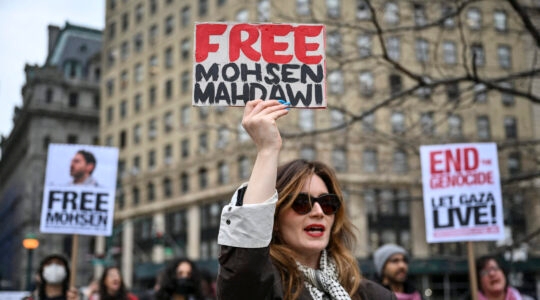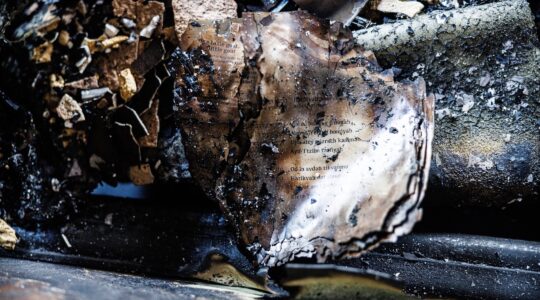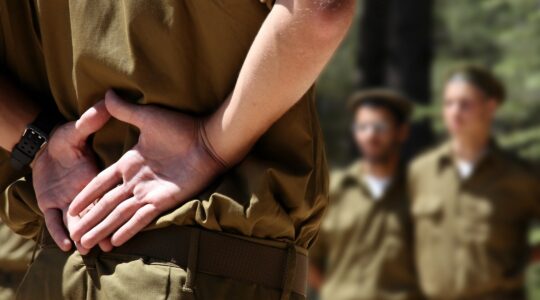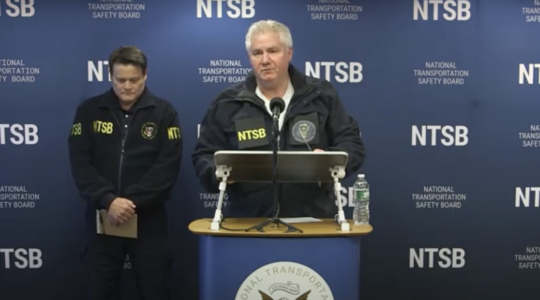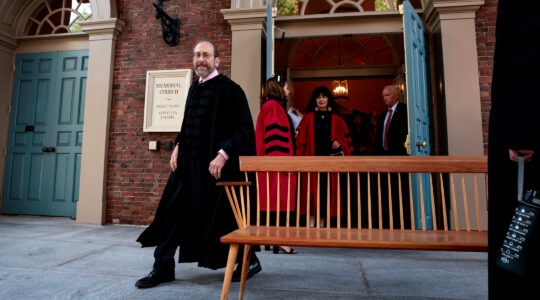This article was produced as part of JTA’s Teen Journalism Fellowship, a program that works with Jewish teens around the world to report on issues that affect their lives.
Jewish men often accessorize with yarmulkes; Texan men sometimes accessorize with guns. If a man is both Jewish and Texan, you might find him in synagogue with both, a scenario that creates a unique environment for Jewish Texan teenagers to learn and to develop thoughts about guns.
While Jews across America have the lowest gun ownership rate of all religious groups, some Jews in Texas approach the issue of guns differently.
“They all carry guns in their suit pockets,” Max Levin, 15, said of the men at his Orthodox synagogue in Dallas, Texas. He said that they carry “for safety,” which, to him, is needed in a post-Oct. 7 world of increasing antisemitism.
Many of the Jewish Texan teens JTA talked to appreciate their state’s gun culture in light of the aftermath of Oct. 7, the Hamas attacks in Israel that sparked the war in Gaza and led to an anti-Israel and often antisemitic backlash in the United States and elsewhere. It’s one out of many factors shaping their stances on guns. Local Jews also have vivid memories of the 2022 crisis at Congregation Beth Israel in nearby Colleyville, Texas, when a gunman took synagogue members hostage.
“My whole family never thought about owning a gun before Oct. 7,” said Evelyn Benloulou, 14, who moved to Canton, Texas from Los Angeles in 2021, then relocated to Dallas in 2023. Following the events of Oct. 7, her parents took gun training/safety courses and bought guns, which Benloulou said they never would have done in L.A. Benloulou attributes her family’s gun ownership (and her plan to someday own a gun) to a combination of the effects of Texas gun culture and rising antisemitism.
Despite, or perhaps as a result of, living in a state famous for its lack of gun restrictions and growing up Jewish amid widespread antisemitism, these teens approach guns with complexity and nuance. They come from diverse backgrounds, attend various high schools and identify with different Jewish denominations, but their perspectives share some common, complicated themes.
Almost none of these teenagers live in households with guns, yet almost all of them plan to own guns in the future. All of them agree that gun ownership is an American right, while also agreeing on the need for some form of regulation. Many of them see a Jewish connection to their beliefs, but none of them say that only their Judaism drives their position on guns.
Many of them have shot guns themselves and/or been to gun training courses, yet they all still acknowledge that handling a gun comes with power, responsibility and potential for harmful consequences.

Attendees ride an escalator during the National Rifle Association Annual Meeting at the Kay Bailey Hutchison Convention Center in Dallas, May 17, 2024. Justin Sullivan/Getty Images)
Benloulou, like other teens JTA talked to, feels safer at synagogue with armed guards at the door.
“They’re keeping the synagogue safe and that does make me feel more comfortable,” said Benloulou, because “a gun is really the best way to fight back” and “protect the Jewish community,” an attitude expressed by many teens.
“Gun ownership has this feeling of security that isn’t really provided right now,” said Tannah Levin, 16, from Dallas, Texas. She and her younger brother, Max, used to attend Jewish day school and now attend public high school. Said Max: “Recently, when I think of guns and Judaism, I think of Oct. 7.”
Max and Tannah were born in Australia (a country that strictly regulated firearm ownership following a mass shooting in 1996). They moved in 2016 to Dallas, where the prevalence of guns gave them a culture shock. Guns, a rare sighting in Australia, can be spotted often in Texas, where 45.7% of adults in 2021 said they live in homes with guns, according to the RAND Corporation.
Her family does not own guns, but after growing up in Texas, Tannah plans to own a gun in the future because “it provides a feeling of safety and comfort.” Her brother feels similarly. Even so, both Levins think of guns as harmful objects and say that their stance depends on local gun laws and culture. As Max said, “I’d only want to own a gun since other people are allowed to as well.”
Native Texas teens JTA talked to say they feel significantly more attached to their constitutional right “to keep and bear arms.”
“I believe in the Second Amendment,” said Jonah G., 15, a former Jewish day school student who currently attends public high school. He was born and raised in Dallas, which he said is why he feels comfortable around guns. He asked that his last name not be used out of fear that others’ judgment of his views might negatively impact his future.
Carrying a gun is “definitely a statement piece,” Jonah G. said, but not necessarily a bad one. Though his family does not own guns, he plans to own one as an adult, because, he said, “it’s very important to be able to protect the people I love.” The Jewish teenagers JTA talked to frequently used the word “protect” to describe their stance on guns.
“The criminals are always going to get guns,” said Jonah G. “So I would feel a lot safer knowing that I had a means of protection.” He said that guns in the right hands make him feel safer, but added that “determining the right hands is a lot trickier.”
Among Texas teens, there is a wide range of opinions on firearm regulation. Students were among the demonstrators who came out to protest when then presidential candidate Donald Trump addressed the National Rifle Association convention in Dallas in May. The protesters noted the toll of mass shootings in the state — including the massacre in 2022 at Robb Elementary School in Uvalde, when 19 kids and two adults were killed by a teenager with an AR-15 — and statistics noting that nearly 60% of gun deaths in Texas are suicides.
One Dallas teen, whose family requested that their name not be used, spoke about the importance of gun control and the necessity of discussing the risks, especially with children, before bringing a gun into the house.
“It’s a tragic thing if someone is messing around with something they don’t know the full capacity of,” said the 17-year-old. The teen observed how many Texans regard hunting trips with their children as “almost like a coming of age thing here…a celebrated thing.” (Texas issued over 1.1 million hunting licenses, tags, permits, and stamps in 2024, more than any other state.) The teen agrees that “people should get to defend themselves and feel secure.”
Self-defense has deep roots in Judaism. “If someone comes to kill you, rise and kill him first,” advises the Talmud (Sanhedrin 72a:4), the set of rabbinic commentaries that form the basis for Jewish law. The sages allow and even encourage self-defense in situations such as homeowners fighting back against trespassers. This concept contributes to many teens’ understanding of self-defense: Benloulou said that while Judaism forbids needless violence, it provides an exception for protection against harm.
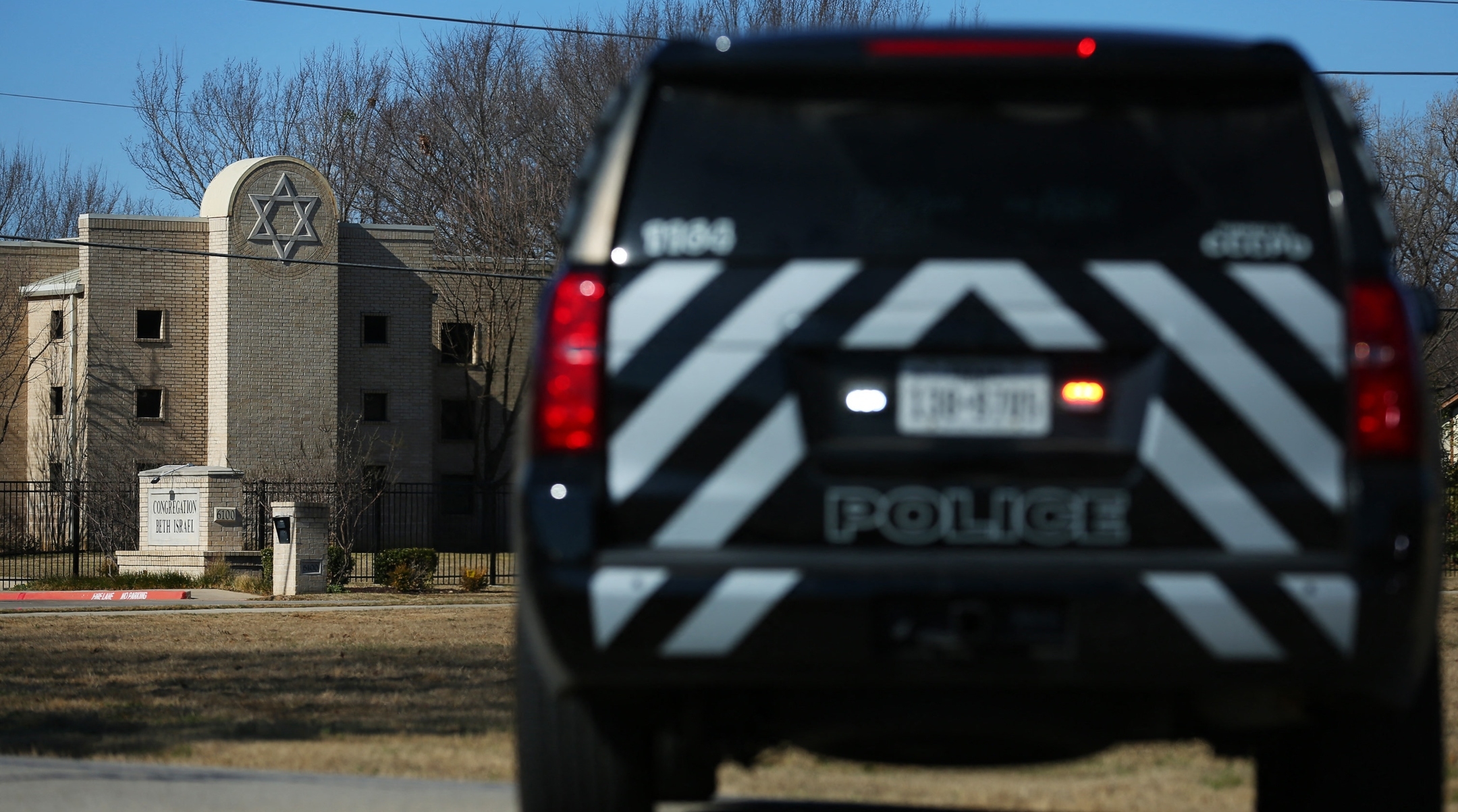
A police vehicle sits outside of Congregation Beth Israel Synagogue in Colleyville, Texas, some 25 miles west of Dallas, Jan. 16, 2022. (Andy Jacobsohn/AFP via Getty Images)
The teens also seem aware of the many Jewish teachings about the preciousness of life and the responsibility to sustain it. One teen referred to the idea that God created humans “in the image of God” (Genesis 1:27) and highlights the Jewish prohibition against self-harm (based on Deuteronomy 4:9).
Many rabbis and Jewish organizations express this duality in traditional Jewish thought when debating gun ownership. “Jewish tradition recognizes that every life is sacred; at the same time, some of our texts balance the right to own weapons with the safety prescriptions necessary to assure that the innocent are protected,” said Rabbi Amy Wallk Katz, a Conservative rabbi in Springfield, Massachusetts, in a written statement to JTA, reiterating the views she expressed in a 2013 Moment magazine article. She emphasizes the need to protect life, which was created in the Divine Image, while acknowledging Talmudic allowances for self-defense.
Ultimately, Wallk Katz concludes that whether a Jew should support or oppose gun rights “depends upon the individual’s application of Jewish sources to our situation today.”
In the same Moment symposium, Rabbi Irving “Yitz” Greenberg, a Modern Orthodox theologian, said the proven dangers of gun ownership outweigh the obligation of self-defense. “In practice, Jews should restrict — ideally, prohibit — carrying guns because this is a life-threatening practice,” he wrote.
A number of the largest Jewish groups have advocated for stricter gun control, including the Jewish Council for Public Affairs, the Religious Action Center of Reform Judaism and Jewish Women International. JWI in particular notes the toll of guns in gender-based violence. “The biblical commandment [is] to not stand idly by when your community member is experiencing violence,” said Meredith Jacobs, CEO of JWI, in a written statement to JTA.
The Jewish Texan teenagers JTA talked to can see both sides.
“Guns can be very powerful, very dangerous,” Jonah G. said, “but they can also be used for good.”
JTA has documented Jewish history in real-time for over a century. Keep our journalism strong by joining us in supporting independent, award-winning reporting.
